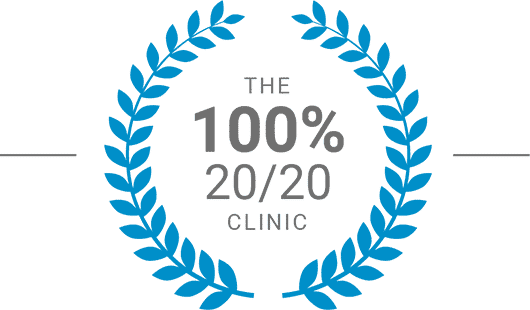Book Your Free Consultation
Mr David Allamby
MD, FRCOphth, FRCS
LASIK isn't a good fit for everyone.
You'll need to be over 18, have a stable prescription for at least the last year, and generally have healthy eyes.
Still not sure if you're eligible? Book a telephone consultation and a member of our team can discuss your options for treatment.
The world of vision correction has witnessed incredible advancements, and among the most remarkable is LASIK eye surgery in London (Laser-assisted in situ keratomileusis).
LASIK has transformed the landscape of vision care by offering a highly effective solution for common vision problems such as nearsightedness, farsightedness, and astigmatism.
If you've found glasses or contact lenses inconvenient, then LASIK treatment at Focus Clinics could be the game-changer you've been looking for.
However, it's essential to determine your suitability for the procedure. Several factors must be carefully evaluated to ensure the best possible outcome. Your journey to improved vision begins with this critical assessment.
If you're wondering whether LASIK eye treatment is the right choice, there are some key criteria to consider. If you meet the following conditions, the likelihood is high that you could be a suitable candidate for LASIK:
Are you above 18 years of age?
Has your prescription remained consistent for 1 year?
Are your eyes otherwise healthy?
While meeting these criteria is a great starting point, it's important to emphasise that a definitive determination of your eligibility for laser eye surgery requires a comprehensive consultation and eye examination. This will give Focus Clinics an accurate assessment of your suitability for the procedure.
Don't hesitate to take the next step towards improved vision. Book your free telephone consultation with us today. Our dedicated team members will guide you through the treatment options tailored to your unique circumstances, helping you make an informed decision about your vision correction journey.
We offer a number of vision correction treatments at our London Clinic.
We can give you a good idea of your suitability over the phone and schedule you for an initial consultation.
In the almost fifty years since laser eye corrective surgeries became available, we have developed an extensive understanding of who is most suitable for LASIK.
Factors that impact LASIK eligibility are:
LASIK candidates must be a minimum of 18 years old. However, it's worth noting that extremely high prescriptions or vision changes can still occur beyond the age of 21. The age at which people typically seek LASIK varies based on their vision needs.
In their 20s and 30s, individuals often pursue LASIK to correct nearsightedness (myopia), sometimes accompanied by astigmatism. In contrast, those in their 40s, 50s, and 60s may opt for LASIK to address age-related close-up vision loss, known as presbyopia.
Interestingly, the number of people with short-sight is rising due to increased screen time, contributing to a higher prevalence of the condition.
If your glasses or lens prescription is extremely high, LASIK may not be the procedure for you. For these high refractive errors, LASIK results can be less predictable.
Minimum Prescription (dioptres) | Maximum Prescription (dioptres) | |
|---|---|---|
Short-sight (myopia) | -0.25 | -14.00 |
Astigmatism | 0.25 | 6.00 |
Long-sight (hyperopia) | +0.25 | +6.00 |
Presbyopia (reading glasses) | +0.50 | +2.50 |
If you suffer from more severe refractive errors, treatments such as ICL or RLE surgeries may be more suitable options for you.
Long-term eye dryness can increase your chances of having post-op complications after LASIK treatment. That’s why it’s so important to be aware of the preconditions leading to dry eyes:
Women statistically experience eye dryness more than men, by at least half, according to a US study. Postmenopause, pregnancy, HRT, birth control, and other natural hormonal changes can all be causes of dry eye disease in women.
Certain conditions, such as rheumatoid arthritis, thyroid disease, or lupus.
High levels of screen time.
Medications such as beta-blockers or immunosuppressants.
Smoking tobacco products.
Dry eye disease is a growing problem, with 25% of general eye clinic patients reporting eye dryness.
Maintaining a stable refraction, which essentially refers to the prescription for your glasses or contact lenses, is crucial in determining LASIK eligibility. Being above the age of 22 often corresponds to a higher likelihood of having a stable refraction.
However, if you've recently experienced a significant change in your refraction, it's advisable to wait until your prescription has stabilised with two similar and consecutive prescriptions.
This waiting period is essential to prevent undergoing laser surgery and subsequently encountering further changes in your prescription. Stable refraction provides a more reliable foundation for LASIK, ensuring the long-term effectiveness of the procedure.
When considering LASIK, it's essential to recognise that motivations and expectations vary among individuals. Whether you're looking to boost your self-confidence or enhance your vision, your reasons for seeking LASIK are unique.
However, these individual motivations underscore the importance of assessing suitability based on several key factors:
While LASIK is highly effective, no medical intervention can guarantee 100% outcomes. You must have realistic expectations.
LASIK involves a degree of self-administered aftercare and compliance with prescribed treatment plans. Willingness to follow medical advice and instructions is a critical aspect of the LASIK journey.
Smoking is associated with various clinical eye conditions, such as dryness, which LASIK can exacerbate for up to six months.
Despite LASIK being minimally invasive, there are several conditions which can act as roadblocks or outright prohibit the administration of the surgery:
Type of Condition | Why Can I Not get LASIK? |
|---|---|
Autoimmune diseases: | This is because these conditions prevent the body from healing, a vital stage for LASIK. Patients with HIV may be eligible for LASIK if they have a good immune cell count. |
Inflammatory bowel diseases: | This is due to an increased risk of corneal complications. |
Light-sensitive epilepsy | Patients must remain still during the procedure. Patients with epilepsy who are not triggered by light or have been inactive for 12 months can be considered. |
Multiple sclerosis | This will depend on the nature and progression of your condition. |
Diabetes | Patients whose diabetes is not well-controlled or with signs of retinopathy may not be suitable. |
Glaucoma, cataracts, nystagmus, blepharitis, herpes, other corneal disorders and retinal diseases | Aside from a refractive issue, your eyes must be healthy and stable for LASIK surgery to be safe and effective. Your eyes will be assessed for these conditions and their potential to impact LASIK treatment. |
Several medications are associated with LASIK risks for various reasons:
Type of Medication | Why Can I Not Get LASIK? |
|---|---|
Immunosuppressants | These medications impact how the body heals and can lead to LASIK complications. |
Anti-inflammatory medications | These medications impact how the body heals and can lead to LASIK complications. |
Drugs which decrease tear production: Beta blockers, roaccutane, isotretinoin | These medications can lead to dry eyes, which will exacerbate the side effects of LASIK during the healing process. |
Oral steroids | Patients taking steroids may have conditions which increase the likelihood of developing infections or other complications. |
These are not exhaustive lists, and checking with your surgeon during your initial assessment with us about any medical conditions or medications you are taking is essential to attaining the best course of action.
LASIK is typically suitable for individuals at least 18 years of age, have a stable prescription, and are in good general health.
LASIK may not be the best option for those with autoimmune disorders, uncontrolled chronic conditions like diabetes, or individuals who are pregnant. In such cases, waiting for the right time to pursue LASIK treatment may be necessary.
Yes, having a stable prescription for at least one year is a crucial requirement for LASIK. A consistent prescription indicates that your vision has stabilised, increasing the likelihood of a successful and lasting outcome.
LASIK surgery costs in the UK can vary based on factors such as whether you require correction for reading glasses and the specific clinic you choose. At Focus Clinics, you can use our free finance calculator to estimate the cost of LASIK tailored to your individual needs. This tool clarifies the financial aspects of your LASIK journey, making it easier to plan for the procedure.
Book a FREE* Consultation
To get a better idea of how we can help you, and also the different types of services we offer, book a consultation now.

100% 20/20 vision
Focus Clinic has a remarkable 100% success rate for 20/20 vision. We know of no other clinic that has matched these results. There is a big difference between, for example, 98% and 100% success, especially if you are in the 2%.

10 year guarantee
Your 10 Year Guarantee means you can return at any time if you have additional questions on the quality of your vision. If you have distance vision correction for short-sight then any repeat laser eye treatments to correct a return of myopia in the first 10 years are included free of charge.*

Most trusted eye treatment clinic
We have the highest trust rating of any ‘eye treatment’ rated clinic, according to independent review site TrustPilot. With an outstanding 9.9 out of 10, when it comes to your eyes, choose the clinic that actual patients trust the most.
*Terms and conditions apply, excludes any age-related changes and conditions unrelated to the primary treatment